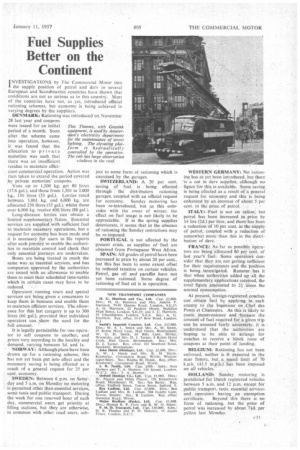Fuel Supplies Better on the Continent
Page 69

If you've noticed an error in this article please click here to report it so we can fix it.
I NVESTIGATIONS by The Commercial Motor into the supply position of petrol and dery in several European and Scandinavian countries have shown that conditions are not so serious as in this country. Most of the countries have not, as yet, introduced official rationing schemes, but economy is being achieved in varying degrees by the suppliers.
DENMARK: Rationing was introduced on November 28 last year and coupons were issued for an initial period of a month. Soon after the scheme came into operation, however, it was found that the allocation to private motorists was such that there was an insufficient residue to maintain efficicient commercial operation. Action was then taken to extend the period covered by private motorists' coupons.
Vans up to 1,500 kg. get 80 litres (17.6 gal.), and those from 1,501 to 3.000 kg., 150 litres (33 gal.). Lorries rated between 3,001 kg. and 6,000 kg. are allocated 250 litres (55 gal.). whilst those over 6.000 kg. receive 400 litres (88 gal.).
Long-distance lorries can obtain a limited supplementary ration. Essential services are supplied with sufficient fuel to maintain necessary operations, but a request for economy has been made and it is necessary for users to file reports after each journey to enable the authorities to maintain control and check that only essential journeys are undertaken.
Buses are being treated in much the same way as 'essential seryices, and bus companies approved by the authorities are issued with an allowance to enable them to meet their scheduled time-tables which in certain cases may have to be reduced.
Operators running tours and special services are being given a concession to keep them in business and enable them to maintain efficient services. The allowance for this last category is up to 300 litres (66 gal.), provided that individual operators can. show the need for the full amount.
It is legally permissible for one operator to sell coupons to another, and prices vary according to the locality and demand, varying between 3d. and Is. ' NORWAY: Although plans have been drawn up for a rationing scheme, this has not yet been put into effect and the necessary saving is being effected as a result of a general request for 25 per
cent. economy. ,• SWEDEN: Between 6 p.m. on Saturday and 5 a.m. on Monday no motoring is permitted other than essential services. some taxis and public transport. During the week 'for one reserved hour of each day, commercial users get priority at tilling stations, but they are otherwise, in common with other road users. sub This Thames, with Geesink equipment, is used by Amsterdam's electricity department for the maintenance of street lighting. The elevating platform is hydraulically controlled by the operative. The cab has large observation
windows in the roof.
ject to some form of rationing which is exercised by the garages.
SWITZERLAND: A 20 per cent, saving Of fuel is being effected through the distributors rationing garages coupled with an official request for economy. Sunday motoring has been re-introduced, but as this coincides with the onset of winter, the effect on fuel usage is not likely to be appreciable. If in the spring supplies deteriorate, it seems that in the absence of rationing the Sunday restrictions may be re-imposed.
PORTUGAL is not affected by the present crisis, as supplies of. fuel are obtained from Portuguese West Africa.
SPAIN: All grades of petrol have been increased in price by about 20 per cent., but this has been to some extent offset by reduced taxation on certain vehicles. Petrol, gas oil and paraffin have not yet been rationed. Some degree of rationing of fuel oil is in operation. WESTERN GERMANY: No rationing has a's yet been introduced, but there is a cut in dery supplies, although no figure for this is available. Some saving is being effected as a result of a general request for economy and this is .being enhanced by an increase of about 5 per cent. in the price of petrol. •
ITALY: -Fuel. is not on ration, but petrol has been increased in price by 14 lire (2d.) per litre, and there hasbeen a reduction of 10 Per cent. in' the supply of petrol, coupled with a reduction of somewhat more than this in the distribution of derv.
FRANCE: As far as possible Operators are being allocated 80 per Cent, of last year's: fuel.Some operakors consider that they are not getting sufficient for their requirements and the :position is being -investigated. Rumour .has it that when authorities added up. all the supplementary applications received, the total. figure amounted to 21 times the normal consumption.
At present, foreign-registered coaches can' .obtain fuel by applying in each county to the Ingenieur en Chef des Pouts et Chaussees. As this is likely to cause inconvenience and 'because the amount of fuel required for a given trip can 'be assessed fairly accurately, it is understood that the authorities are hoping to be able to arrange for coaches to receive a block issue of coupons at their point. of landing.
BELGIUM: Rationing has not been enforced, neither is it expected in the near future, but a speed limit of 70 k.p.h. (43.5 m.p.h.) has been imposed on all vehicles.'
HOLLAND: Sunday motoring is prohibited for Dutch registered vehicles between 5 a.m, and 12 p.m. except for public transport; taxis, essential services and operators having an exemption certificate. Beyond this there is no form of rationing, but the price of petrol was increased by about 70. per gallon last Monday.












































































































